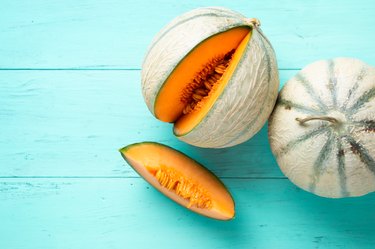Have you ever tried prickly pear? Despite its unusual appearance, this fruit is delicious and loaded with nutrients. Also known as cactus fruit, tuna fruit or cactus pear, it boasts a naturally sweet flavor and can be used in various desserts. Plus, its very low in calories and sugars, which makes it ideal for ketogenic and low-carb diets.
Rich in antioxidants and phytochemicals, the cactus fruit fights inflammation and keeps your immune system strong. It also has beneficial effects on blood sugar levels, blood lipids and bone health.
The tuna fruit has antioxidants (polyphenols, betalain etc.), fiber, minerals, vitamins (B and C), calcium oxalate (non-absorbable complex), iron, magnesium, potassium, phytonutrient, and other nutrients. It reduces the risk of: Cancer (due to the cancer preventive phytonutrient)

Prickly Pears and Weight Loss
The cactus pear can satisfy your sweet tooth and bring you closer to your weight loss goals. A 2015 meta-analysis published in the journal Nutrition indicates that prickly pear consumption may cause significant reductions in body fat, cholesterol levels and blood pressure. These findings show that prickly pears not only promote fat loss but also keep your heart healthy.
In fact, a 2015 study published in BioMed Research International confirms its beneficial effects on cholesterol levels. Elevated cholesterol and heart disease are strongly connected. Therefore, prickly pear benefits your heart — and your waistline.
The journal Current Therapeutic Research has published the results of a clinical trial assessing the effects of prickly pears on body weight. According to researchers, the fiber in this fruit binds to dietary fat and reduces its absorption, leading to weight loss. Fiber also suppresses appetite and increases satiety, making it easier to cut calories and stick to your diet.
Cactus Fruit Nutrition Facts
Whether you want to get leaner, boost your immune system or feel energized, look no further. This superfood provides the nutrients you need to function at your peak. A single fruit offers 24 percent of the daily recommended vitamin C intake along with high doses with calcium, magnesium, potassium and copper. On top of that, it has only 42 calories.



Compared to most fruits, prickly pear is quite low in carbs. It has only 9.9 grams of carbohydrates, including 3.7 grams of fiber. Youll also get small amounts of vitamin A, vitamin B6, niacin, thiamin, iron and selenium.
If youre on a low-fat diet, this fruit is a great choice. With less than one gram of fat per serving, its a perfect addition to your slimming plan. Its rich, sweet flavor will satisfy your cravings. Use it in fruit juices, homemade pie, sugar-free jam, citrus salad, lemon bars, pancakes, smoothies and other desserts.
How to Eat Cactus Fruit (Prickly Pear) | Taste Test
FAQ
What is tuna fruit in English?
How many prickly pears can I eat a day?
What is the nutritional value of the tuna fruit?
Is prickly pear fruit healthy?
What are the benefits of eating tuna fruit?
Tuna fruit can lower and regulate your blood sugar levels. The regulation is usually achieved by decreasing the intestinal absorption of glucose. The fruit’s dietary fiber and pectin content aid in the process. Once the blood sugar levels are brought back to normal, type II diabetes can be managed quite easily. 4. Improved Heart Health
What are the benefits of tinned tuna?
Food is considered a good source of protein and unsaturated fats, such as omega-3, in addition to iron and zinc. Omega-3 is an essential fat for the proper functioning of the body. It helps, for example, to lower cholesterol and triglyceride levels and to control blood sugar. Omega-3 is still a powerful ally in brain cell renewal, that is, it helps in the fight against degenerative diseases and even in memory. The best option is to preserve it in water, as it concentrates a greater amount of nutrients from the fish, such as omega-3 itself, and does not have soy oil added.
Is tuna good for You?
It was found that tuna fruit reduces body fat, cholesterol levels, and blood pressure, to boost overall health. Improves heart health – Because tuna fruit is low in saturated fat and cholesterol, it is considered a heart-healthy choice. Its potassium content may also help lower blood pressure and reduce the risk of cardiovascular diseases.
Is tuna a healthiest fruit?
Tuna is widely recognized in the medical community as one of the healthiest fruits. In a 2014 review featured in the Molecules Journal, the fruit is highly rich in phytochemicals with antioxidant and neuroprotective effects.
